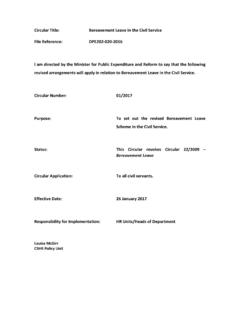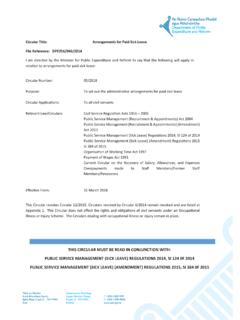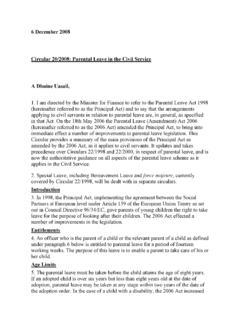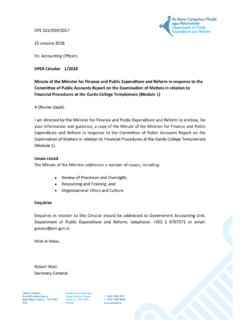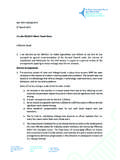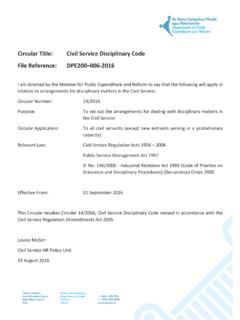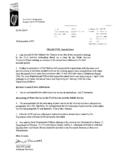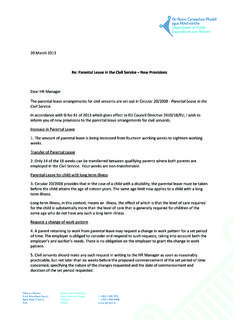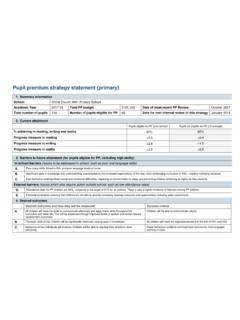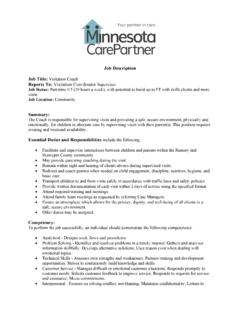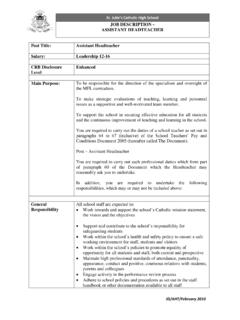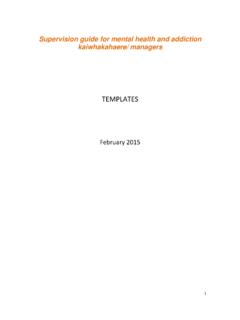Transcription of Civil Service Management of Underperformance Policy
1 Circular Title: Civil Service Management of Underperformance Policy File Reference: DPE200-006-2016 I am directed by the Minister for Public Expenditure and Reform to say that the following will apply in relation to managing Underperformance in the Civil Service : Circular Number: 24/2016 Purpose: To set out the arrangements for managing Underperformance in the Civil Service Circular Application: To all Civil servants (except new entrants serving in a probationary capacity) Relevant Law: Civil Service Regulation Acts 1956 2005 Effective From: 01 January 2017 Louise McGirr CSHR Policy Unit 28 October 2016 2 Contents: Part 1: Purpose and principles Part 2: Addressing issues of Underperformance informally Part 3: Underperformance Management Process Step 1 Prepare for a Performance Review Meeting Step 2 Performance Review Meeting Step 3 Commence a Performance Improvement Plan (PIP) Step 4 First Progress Review Meeting Step 5 Progress Review Meetings 2-5 Step 5(a) Performance improving Step 5(b) Progress not satisfactory Step 6 Conclusion of a PIP Part 4: Follow up action where performance lapses following successful completion of a PIP Part 5: Support for managers Appendix A: Strategies for dealing with some common reasons for Underperformance Appendix B: Sample Performance Improvement Plan (PIP) Appendix C: Sample Progress Review Meeting Evaluation Sheet Appendix D: Template letter Notification of a Progress Review meeting Appendix E: Template letter Notification of a Verbal or Written Warning Appendix F.
2 Appeal from a Written Warning issued under the Underperformance Policy 3 Part 1: Purpose and principles Purpose The purpose of this Circular is to provide a clear framework to help managers to identify and deal with issues of Underperformance effectively in the Civil Service . This Circular will apply to all Civil servants other than new entrants serving in a probationary capacity. Principles The Civil Service is committed to providing efficient and well-managed services. In circumstances where a concern arises about the performance of an individual it may be necessary to take action under this Policy . Where such circumstances arise, all Civil servants must be treated in a fair and equitable manner which will normally include: - the right of a Civil servant to be informed of any concern about his or her performance; - the right of reply to any such concern, if raised; - The right to be represented (where appropriate) by a serving Civil servant or by an official employed by a trade union holding recognition from the relevant Department or Office in respect of Civil servants at that grade or rank; and - the right to a fair and impartial determination of the matter after all relevant facts have been considered.
3 Line managers are responsible for making Civil servants aware of the acceptable standards of performance expected from them and for dealing with shortcomings promptly and fairly. In general the line manager will deal with any concern on an informal basis, first through discussion and appropriate assistance, before dealing with the matter through this Policy . While it is envisaged that the line manager will have responsibility for performance Management , any reference to line manager or manager in the Policy may mean a line manager or a different manager as appropriate to the specific situation. All Civil servants must comply fully with any Underperformance process. A Civil servant who fails to comply with an Underperformance process, without reasonable cause, will be in breach of his / her terms of employment and will be subject to disciplinary action.
4 This Policy is also underpinned by: - honesty, openness and transparency; - mutual responsibility; - accountability; - clearly specified expectations; - confidentiality; and - a safe and supportive working environment. 4 What is Underperformance ? Underperformance includes, but is not limited to: - ongoing failure to meet specified, realistic objectives and standards; and - unsatisfactory work performance, a failure to perform the duties of the position. Underperformance should generally be dealt with through the application of this Underperformance Policy . However, there may be circumstances where the conduct of a Civil servant could fall under the heading of misconduct1 or Underperformance or both and, in such circumstances, the manager has the discretion to use the Disciplinary Code2 or this Underperformance Policy to deal with those concerns.
5 For example, some types of behaviour (such as lateness) might be regarded as Underperformance in one context or misconduct in another. Managers have discretion to apply whichever Policy they believe to be appropriate to the circumstances. The fact that certain behaviour could have been addressed within the Underperformance Policy does not preclude it from being addressed under the Disciplinary Code. Incapability to undertake work for health reasons If a Civil servant is incapable to undertake work as a result of health reasons then advice should be sought from the HR Unit who will consider appropriate supports, such as referral to the CMO, before deciding upon an appropriate course of action. Role of managers It is the responsibility of line managers to: - adopt a consistent, effective approach to performance Management ; - agree realistic targets; - monitor and assess a Civil servant s performance based on information available; - tackle any Underperformance issues promptly; - provide regular constructive feedback; - hold informal meetings to review any issues which arise; 1 Misconduct encompasses any type of behaviour that breaches acceptable standards in the workplace.
6 Misconduct may also include inappropriate behaviour outside the workplace which has an impact, or could reasonably be likely to have an impact, within the workplace. Misconduct should generally be dealt with through the application of the Civil Service Disciplinary Code. 2 Any reference to the Disciplinary Code means the Civil Service Disciplinary Code which is in place at the time of the matter under consideration. 5 - consider measures aimed at improving a Civil servant s performance through training or development; - design and implement a Performance Improvement Plan (PIP) where Underperformance issues persist; and - review a Civil servant s performance at the Mid-Year and End of Year reviews under Performance Management Development System (PMDS). Record keeping When dealing with Underperformance , managers should keep records of all meetings and information gathered, including: - summaries/notes of meetings, discussions or plans relating to Underperformance ; - correspondence (including emails) relevant to the Underperformance ; and - relevant information / responses provided by the Civil servant whose Underperformance is being addressed.
7 All relevant documents should be retained locally by the manager and relevant documentation should be made available to the Civil servant during the process. The manager should ensure that the documentation is provided to any new manager that replaces him or her as the manager of the Civil servant for the purposes of this Policy where relevant and appropriate. Timeframes The timeframes outlined in this document should be treated as a guide to all parties involved in the process. All parties should work to address the matter in a timely and efficient manner. Frustration of the Underperformance process It is the duty of all Civil servants to participate in the process set out in this Policy when required to do so. Where a Civil servant fails or refuses (without reasonable cause) to do so, then the manager may decide to deal with non-participation in the process as misconduct under the Disciplinary Code.
8 The manager should seek the advice of the HR Unit when such issues arise. Civil Service Employee Assistance Service (CSEAS) The CSEAS provides free and confidential3 supports to assist Civil servants in managing work and/or life difficulties. The Service is available to either the manager or the individual staff member. Managers can contact the CSEAS if they have concerns about a Civil servant. The manager will be afforded 3 See CSEAS website for details on confidentiality and exceptions to this. 6 the opportunity to discuss these concerns in a confidential and supportive environment. The option of referring the Civil servant to the CSEAS can also be discussed. Where a manager is addressing Underperformance , attendance or behaviour issues, referral to the CSEAS may be an option to help improve the situation.
9 The manager can either suggest to the Civil servant to self-refer to the CSEAS or can formally refer him / her. In cases of formal referrals, confirmation of attendance / engagement will be provided to the referring party and any proposed feedback will be agreed with the Civil servant. If the referred Civil servant chooses not to avail of the support of the CSEAS, this will be communicated to the referring party. Full details on services available, referral options, confidentiality and useful resources are available on the CSEAS website 7 Part 2: Addressing issues of Underperformance informally It is the responsibility of a line manager to agree realistic targets and objectively monitor and assess a Civil servant s performance. Regular constructive feedback should be provided to the Civil servant and any signs of performance issues should be tackled promptly.
10 Where issues of Underperformance arise an informal meeting should be arranged with the Civil servant to address the issues and attempt to resolve them collaboratively. At the informal meeting the manager should: - provide clarification regarding requirements and expectations objectives, standards and priorities; - advise the Civil servant how his / her performance is unsatisfactory and cite specific examples to illustrate this; - explore the reasons why there is an issue (see Appendix A for Strategies for dealing with some common reasons for Underperformance ); and - review support measures which could assist the Civil servant to address performance issues mentoring / training / referral to the Civil Service Employee Assistance Service if personal circumstances are having an impact on performance. When conducting a meeting to discuss Underperformance , it is important to remember that: - all feedback should be addressed to concrete examples of the performance; - the manager should remain positive and focus on the possibility of improved performance in the future; and - at all times, the dignity of the Civil servant must be fully respected.

